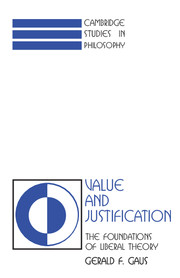VII - TELEOLOGICAL AND DEONTOLOGICAL JUSTIFICATION
Published online by Cambridge University Press: 05 June 2012
Summary
PUBLIC JUSTIFICATION
Moral personality and justification
In the previous chapter, I argued that, psychopathlike valuers aside, a rational valuer-agent must acknowledge the rationality of acting on moral principles even though such principles may require one to act in ways that, all things considered, do not best promote one's values. One must acknowledge the rationality of such action because one's value system presupposes that moral rules and principles provide others with such reasons to act and, further, because one who conceives of others as possessing moral personality in this sense is committed to acknowledging that he too is a moral person, that is, he possesses the capacity to act rationally on moral principles. As I have said, to conceive of self and others as moral persons, then, requires that one sees oneself and others as capable of following a nomos. We can feel indignant toward moral persons, trust them and be their friends, because they are more than valuers; they can follow a nomos.
Now this is an important conclusion: it establishes our deep commitment to the rationality of moral action, both in the sense that (i) we believe that others have reason to act morally, and (ii) each of us is rationally committed to acknowledging that he also has such reasons. Yet, though important, this conclusion upholds the rationality of moral action only at a general level. That is, I have argued that we nonpsychopathic valuers presuppose the rationality of moral action that does not, all things considered, best promote one's values.
- Type
- Chapter
- Information
- Value and JustificationThe Foundations of Liberal Theory, pp. 319 - 378Publisher: Cambridge University PressPrint publication year: 1990



